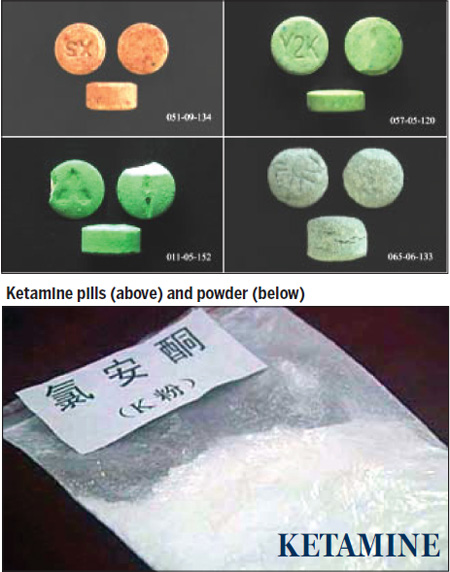Prospective laws on mandatory drug test, drug-driving offences
Updated: 2010-03-05 07:35
By Joseph Li(HK Edition)
|
|||||||||
On February 25, the Narcotics Division of the Security Bureau published a student drug abuse survey in 2009-09. Some 158,000 students were randomly selected, with tertiary and primary students being covered for the first time.
Over 6,460 students admitted they had consumed drugs, the survey said, and the alarming fact is the number of drug consumers under the age of 12 has doubled to 4.6 percent.
In fact, students from all the surveyed tertiary institutions, 99 percent of the secondary schools and 89 percent of the primary schools admitted having used drugs.
Under Secretary for Security Lai Tung-kwok admitted that the youth drug problem is a longstanding one. In the past, young people were addicted to traditional drugs such as heroin, but the trend has quickly changed to consumption of psychotropic substances such as ketamine, ice and ecstasy, with over 90 percent of young users favoring ketamine.
Made in the laboratory, it is used for anesthetic purposes, but it is being abused as a kind of psychotropic drug by increasing numbers of young people, he said.
Over the past four years, the number of young people under 21 consuming drugs surged dramatically, by 57 percent. In particular, the number of students consuming drugs rose from 22 percent in 2004 to 26 percent in 2008.
The major concern is the increasing number of young females addicted to drugs, with the decreasing age of people exposed to drugs for the first time representing a second worrying trend.
"The average age of first-time drug consumers is 15," he said. "In certain cases, the age of the first-timers is as low as 9 - 10."
Consumption of ketamine, which is in powder form, is very convenient and popular among youngsters, because they can smell it with their nose, said Lai.
As the method of consumption is very clandestine, they think they will not be easily detected.
They also think ketamine does not cause immediate harm to the body; however, it will harm their organs little by little.
"We have commissioned a laboratory test with guinea pigs and their brain cells show signs of dementia after they are fed with ketamine. As their bladders are also affected, people need to go to the toilet frequently and cannot lead a normal life," he warned.
At present, drug tests are done through examination of urine samples, but the government has explored the viability of examination of hair samples.
Examination results of urine samples can be obtained in just a few minutes, he said, and such tests can detect whether the students have consumed drugs recently.
It has, however, one limitation, in that it cannot detect drug consumption over a longer time.
The advantage of a hair drug test is it can detect drug consumption as long as five to six months earlier, even though it cannot detect drug traces a few days prior to the test.
"Drug tests of urine and hair samples can complement each other," Lai said. "For example, we can find out whether a person who is on a six-month rehabilitation programme has consumed drugs during the period by checking his hair sample."
Lai further said the war on drugs needs the support of the entire society and not just the government alone. Within this year, the government is going to launch a public consultation on a mandatory, city-wide drug test on people of all ages, including one that covers students.
"We envisage this will be a highly controversial, complicated issue that involves human rights, privacy and people's basic rights," he stressed. "The government does not have any pre-determined stance and will strive to strike a balance between diverse opinions."
He took the drink-drive legislation as an example. Before the law was enacted, there were those who said that police should not ask drivers to undergo tests without a cause, but society finally reached a consensus after thorough discussions.
On the question of driving, he noted the Transport and Housing Bureau is leading an inter-department working group to study ways to tackle drug-driving, quoting recent cases in which people were caught under influence of dangerous drugs while driving.
However, the existing law does not allow police to obtain bodily samples from the drivers to find out whether they have consumed drugs.
"The government intends to amend the law, empowering police to conduct tests with the drivers, just as in drink-drive cases," he disclosed. The working group is going into intense discussions and may visit foreign countries to learn from their experience.
In the short term, police will enhance checks on drivers who drive their cars in an uncontrolled and erratic manner.
If necessary, police will stop and search the cars to find out whether there are drugs on board.

(HK Edition 03/05/2010 page4)